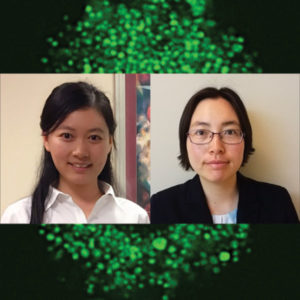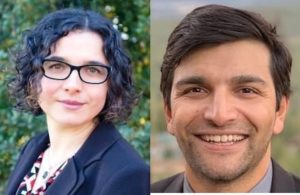
Stanford Molecular Imaging Scholars (SMIS) Program Quarterly Seminar
Zoom meeting: https://stanford.zoom.us/j/99117388314?pwd=R29OSjlTdUt0a3pLaG5Zc1BFNTJIUT09
Password: 922183
Guolan Lu, PhD
Mentor: Eben Rosenthal, MD; Garry Nolan, PhD
“Co-administered Antibody Improves the Penetration of Antibody-Dye Conjugates into Human Cancers: Implications for AntibodyDrug Conjugates”
Dianna Jeong, PhD
Mentors: Craig Levin, PhD; Shan Wang, PhD
“Novel Detection Approaches for Achieving Ultra-fast time resolution for PET”

Dear WMIS trainees, colleagues and friends,
We welcome you to join our upcoming virtual WMIS – Stanford Diversity conference on September 9-11, 2020. We are coming together to reinforce our commitment to diversity and to provide a forum for our team members to engage in meaningful discussions. The conference will provide keynote lectures, scientific presentations and educational lectures from leaders and pioneers in the field, who will discuss important topics related to racial justice, women in STEM and Global Health. We are also offering breakout sessions whereby carefully selected individuals will facilitate a discussion about how to implement more supportive and inclusive practices into our daily professional and personal life. The breakout sessions are designed to enable active involvement of smaller groups where people feel safe to discuss current challenges in the STEM field and actionable solutions.
This conference is free of charge and will provide 9.5 CME credits. Abstracts of all conference presentations and a summary of discussion points and insights provided by all conference participants will be published in Molecular Imaging & Biology. The organizing committee will provide 10 trainee prizes in the form of free WMIS memberships to conference attendants for the 2021 WMIC in Miami.
Website: https://www.wmislive.org

Judy Gichoya, MD
Assistant Professor
Emory University School of Medicine
Measuring Learning Gains in Man-Machine Assemblage When Augmenting Radiology Work with Artificial Intelligence
Abstract
The work setting of the future presents an opportunity for human-technology partnerships, where a harmonious connection between human-technology produces unprecedented productivity gains. A conundrum at this human-technology frontier remains – will humans be augmented by technology or will technology be augmented by humans? We present our work on overcoming the conundrum of human and machine as separate entities and instead, treats them as an assemblage. As groundwork for the harmonious human-technology connection, this assemblage needs to learn to fit synergistically. This learning is called assemblage learning and it will be important for Artificial Intelligence (AI) applications in health care, where diagnostic and treatment decisions augmented by AI will have a direct and significant impact on patient care and outcomes. We describe how learning can be shared between assemblages, such that collective swarms of connected assemblages can be created. Our work is to demonstrate a symbiotic learning assemblage, such that envisioned productivity gains from AI can be achieved without loss of human jobs.
Specifically, we are evaluating the following research questions: Q1: How to develop assemblages, such that human-technology partnerships produce a “good fit” for visually based cognition-oriented tasks in radiology? Q2: What level of training should pre-exist in the individual human (radiologist) and independent machine learning model for human-technology partnerships to thrive? Q3: Which aspects and to what extent does an assemblage learning approach lead to reduced errors, improved accuracy, faster turn-around times, reduced fatigue, improved self-efficacy, and resilience?
Zoom: https://stanford.zoom.us/j/93580829522?pwd=ZVAxTCtEdkEzMWxjSEQwdlp0eThlUT09

Join us for the 3rd Annual Diversity and Inclusion Forum on Friday, October 9, 2020 on Zoom! This virtual event will highlight innovative workshops developed by our residents and fellows with their educational mentors who have participated in the 2019-2020 cohort of the Leadership Education in Advancing Diversity Program.
The event will be an enriching opportunity for all faculty, residents, fellows, postdocs, students, staff, and community members to learn tools and strategies to enable them to become effective change agents for diversity, equity, and inclusion in medical education.
All are welcome to participate and we look forward to seeing you on Friday, October 9!
Register here:
https://mailchi.mp/046c21726371/diversityforum2020-1632872?e=4a913cab2d

In honor of the 30th anniversary of the Americans with Disabilities Act and October as National Disability Employment Awareness Month, join the Stanford Medicine Abilities Coalition (SMAC) for a first of its kind StanfordMed LIVE event focused on disability. Now more than ever during the COVID-19 pandemic, disabilities, health conditions, and illness impact not only our patients but also all of us, both personally and as members of the Stanford Medicine community. Stanford Medicine leadership will share information, answer questions, and engage in a roundtable discussion about the state of disability at Stanford and how best to support faculty, staff, and students living with disability and chronic illness. We encourage our community to submit questions and comments here to be shared broadly with the Stanford Medicine community. The same link can be used to request any accommodations needed for the livestream. Additional information for the webcast itself will be sent out closer to the event.
Livestream link: https://livestream.com/accounts/1973198/events/9288854

Ge Wang, PhD
Clark & Crossan Endowed Chair Professor
Director of the Biomedical Imaging Center
Rensselaer Polytechnic Institute
Troy, New York
Abstract:
AI-based tomography is an important application and a new frontier of machine learning. AI, especially deep learning, has been widely used in computer vision and image analysis, which deal with existing images, improve them, and produce features. Since 2016, deep learning techniques are actively researched for tomography in the context of medicine. Tomographic reconstruction produces images of multi-dimensional structures from externally measured “encoded” data in the form of various transforms (integrals, harmonics, and so on). In this presentation, we provide a general background, highlight representative results, and discuss key issues that need to be addressed in this emerging field.
About:
AI-based X-ray Imaging System (AXIS) lab is led by Dr. Ge Wang, affiliated with the Department of Biomedical Engineering at Rensselaer Polytechnic Institute and the Center for Biotechnology and Interdisciplinary Studies in the Biomedical Imaging Center. AXIS lab focuses on innovation and translation of x-ray computed tomography, optical molecular tomography, multi-scale and multi-modality imaging, and AI/machine learning for image reconstruction and analysis, and has been continuously well funded by federal agencies and leading companies. AXIS group collaborates with Stanford, Harvard, Cornell, MSK, UTSW, Yale, GE, Hologic, and others, to develop theories, methods, software, systems, applications, and workflows.

Date: April 10, 2021 (8 AM-6PM)
-
- 8 AM-8:20 AM opening remarks Zainub and Pete
- 8:20 AM-9:20 AM Talk 1 “I fought the law and no one won”
- 10 minute Break
- 9:30 AM-10:30 AM talk 2 students and doctors with disabilities panel
- 20 minute break
-
- 10:50 AM-11:50 AM Breakout
- One hour lunch (TBD)
- 12:50 PM-1:50 PM Talk 3 the frontiers of disability research
- Lisa Meeks is moderating
- Bonnie Swenor invited
- 10 minute break
- 2:00 PM-3:00 PM breakout 2
- 10 minute break
- 3:10 PM-4:10 PM talk 4 do-it-yourself disability advocacy (Poullos/Tolchin with students)
- 4:10 PM-4:30 PM closing remarks
- 4:30 PM-6 PM virtual happy hour

Targeted violence continues against Black Americans, Asian Americans, and all people of color. The department of radiology diversity committee is running a racial equity challenge to raise awareness of systemic racism, implicit bias and related issues. Participants will be provided a list of resources on these topics such as articles, podcasts, videos, etc., from which they can choose, with the “challenge” of engaging with one to three media sources prior to our session (some videos are as short as a few minutes). Participants will meet in small-group breakout sessions to discuss what they’ve learned and share ideas.
Please reach out to Marta Flory, flory@stanford.edu with questions. For details about the session, including recommended resources and the Zoom link, please reach out to Meke Faaoso at mfaaoso@stanford.edu.

Radiology Department-Wide Research Meeting
• Research Announcements
• Mirabela Rusu, PhD – Learning MRI Signatures of Aggressive Prostate Cancer: Bridging the Gap between Digital Pathologists and Digital Radiologists
• Akshay Chaudhari, PhD – Data-Efficient Machine Learning for Medical Imaging
Location: Zoom – Details can be found here: https://radresearch.stanford.edu
Meetings will be the 3rd Friday of each month.
Hosted by: Kawin Setsompop, PhD
Sponsored by: the the Department of Radiology

CME Grand Rounds Sanjiv Sam Gambhir Lectureship – “Imaging at the Speed of Light: Innovations in Positron Emission Tomography”
Simon R. Cherry, PhD
Professor
Biomedical Engineering & Radiology
UC Davis
Join from PC, Mac, Linux, iOS or Android: https://stanford.zoom.us/j/600003703?pwd=RjcwS2MvOG1qVkxyL3U0RmNtUDVWdz09
Meeting ID: 600 003 703
Password: 566048
Or iPhone one-tap (US Toll): +18333021536,,600003703# or +16507249799,,600003703#
Or Telephone:
Dial: +1 650 724 9799 (US, Canada, Caribbean Toll) or +1 833 302 1536 (US, Canada, Caribbean Toll Free)
International numbers available: https://stanford.zoom.us/u/acuqphnvqT
ABSTRACT
Positron emission tomography (PET) allows for sensitive and quantitative measurement of physiology, metabolism and molecular targets noninvasively in the human body. However, typical clinical PET scanners capture less than 1% of the available signal produced in the body. PET scanners also are not currently capable of precisely determining the location at which a particular decay occurs. These limitations present opportunities for further innovation that ultimately will impact molecular imaging research and diagnostic imaging with PET. This presentation focuses on 1) total-body PET imaging which greatly improves signal collection, allowing radiotracer kinetics to be assessed across the entire human body for the first time, and 2) the development of detector technologies that have a timing precision of ~ 30 picoseconds, enabling direct localization of radiotracer decays without tomographic reconstruction.
BIO
Simon R. Cherry, Ph.D. received his B.Sc.(Hons) in Physics with Astronomy from University College London in 1986 and a Ph.D. in Medical Physics from the Institute of Cancer Research, University of London in 1989. After a postdoctoral fellowship at UCLA, he joined the faculty in the Department of Molecular and Medical Pharmacology, also at UCLA, in 1993. In 2001, Dr. Cherry joined UC Davis and established the Center for Molecular and Genomic Imaging, which he directed from 2004-2016. Currently Dr. Cherry is Distinguished Professor in the Departments of Biomedical Engineering and Radiology at UC Davis.
Dr. Cherry’s research interests center around biomedical imaging and in particular the development and application of in vivo molecular imaging systems. His major accomplishments have been in developing systems for positron emission tomography (PET), in particular the invention of the microPET technology that was subsequently widely adopted in academia and industry and as co-leader of the EXPLORER consortium which has developed the world’s first total-body PET scanner. He also has contributed to detector technology innovations for PET, conducted early biomedical studies using Cerenkov luminescence, and developed the first proof-of-concept hybrid PET/MRI (magnetic resonance imaging) systems.
Dr. Cherry is a founding member of the Society of Molecular Imaging and an elected fellow of six professional societies, including the Institute for Electronic and Electrical Engineers (IEEE) and the Biomedical Engineering Society (BMES). He served as Editor-in-Chief of the journal Physics in Medicine and Biology from 2011-2020. Dr. Cherry received the Academy of Molecular Imaging Distinguished Basic Scientist Award (2007), the Society for Molecular Imaging Achievement Award (2011) and the IEEE Marie Sklodowska-Curie Award (2016). In 2016, he was elected as a member of the National Academy of Engineering and in 2017 he was elected to the National Academy of Inventors. Dr. Cherry is the author of more than 240 peer-reviewed journal articles, review articles and book chapters in the field of biomedical imaging. He is also lead author of the widely-used textbook “Physics in Nuclear Medicine”.